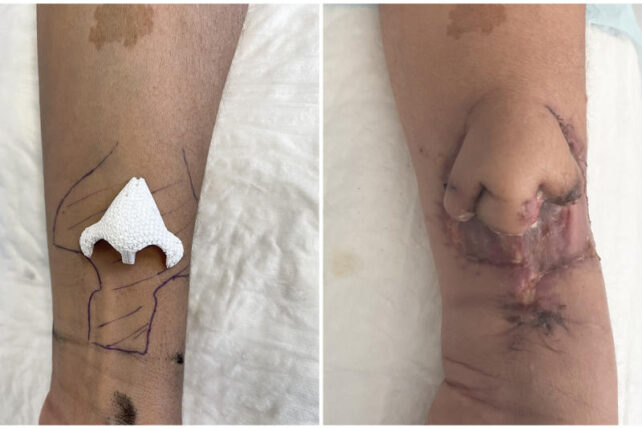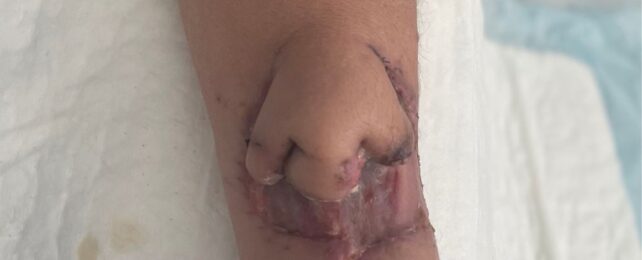A woman in France who lost part of her face to cancer has received a rare nose transplant, one that was printed in 3D.
The custom-made nose was made almost entirely in the lab, and yet blood vessels are too tiny and complex to be woven into the 3D-printed structure. To give the nose a much-needed blood supply, surgeons attached it to a highly vascularized region of the body: the forearm.
After two months of development on her arm, the nose was moved to the woman's face during a six-hour microsurgery that attempted to carefully connect its new blood vessels to the patient's temple.
In November of 2022, after ten days in hospital and three weeks of antibiotics, surgeons from the Toulouse University Cancer Institute in France announced that their patient was "doing very well".
"When I woke up the next day, I was absolutely overwhelmed," the patient told the French daily newspaper Le Monde at the end of 2022.
"I haven't been out for ten years, and my husband and I have decided to go out again soon to a restaurant!"

According to coverage by La Monde, one of the lead surgeons on the case, Agnès Dupret-Bories, was inspired to try implanting a 3D-printed nose after talking to a doctoral student in Belgium several years ago.
This student was a biomaterials scientist, who had previously tested biosynthetic implants on cheekbones while working at a 3D printing company, called Cerhum.
In 2021, Dupret-Bories, along with her colleague, Benjamin Vairel, used Cerhum's help to print a replica nose using hydroxyapatite, a natural mineral that helps form tooth and bone.
Skin and cartilage was then taken from the patient's body and used to give the scaffolding detail.
Lastly, tiny blood vessels from the patient's forearm were allowed to naturally colonize the implant over the course of two months.
"Today, the transplant is a success," reads a translation of a Facebook post from the Hospital Center University De Toulouse, published in November of 2022.
After nine years and several failed nasal reconstructions, the patient finally has her nose back.
Now, she can reportedly smell better than ever.
"This type of reconstruction had never before been performed on such a fragile and poorly vascularised area," officials at the hospital told the London daily newspaper, the Evening Standard.
Surgeons in France now hope to use the revolutionary technique to improve implantation of other body implants in the future.
